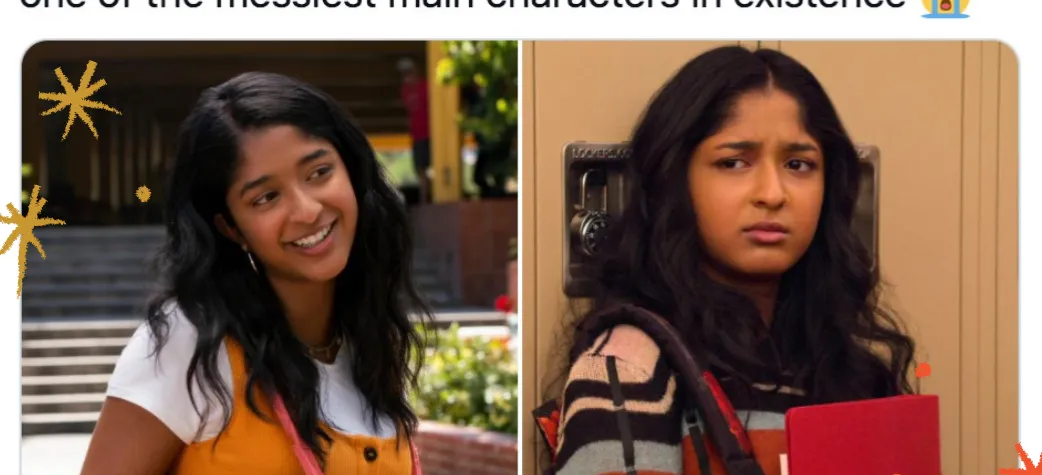Never Have I Ever’s Devi is “One of the Messiest Main Characters in Existence” - and I Love It
Something about her character's deeply flawed nature speaks to my diasporic Indian identity, which has long waited for an imperfect Indian girl like Devi.

Access the Audio Read version of this article directly on Spotify for Podcasters.
"A lot of the criticism that comes along Devi’s way regarding her chaotic nature feels like the result of a society that constantly expects immense maturity from young girls - especially young Black and brown girls."
Netflix’s hit series Never Have I Ever has received quite the fanfare in pop culture last month with the release of its latest season, which features the return of our favorite Indian-American teenager, Devi Vishwakumar (Maitreyi Ramakrishnan). While most of the reactions comprised shippers who broke out into Team Paxton vs. Team Ben, a fair share of them included viewers’ frustrations with the portrayal of Devi’s character this season. Following the previous season’s cathartic finale, where she reunited with her mother just in time to spread her father’s ashes, season 2 picks up right where we left off and, well, not much has changed when it concerns her character arc.
From two-timing a relationship to unknowingly starting an eating disorder rumor that harms her friend Aneesa (Megan Suri), Devi is very much the extremely selfish and problematic train-wreck from season 1, who is impossibly hard to root for as a protagonist. While usually, I would find such a character to be unwatchable and irritating, something about her deeply flawed nature speaks to my diasporic Indian identity, that has long waited for an imperfect Indian girl like Devi.
Growing up as a Tamilian (South-Indian) immigrant girl meant that looking for meaningful representation in Western media was an inconceivable thought. You either turned to the light-skinned actors in Bollywood and Tamil cinema, where women merely existed as ornaments adorned by the larger-than-life heroes, or simply laughed along to the stereotypical depiction of Indians as the “Bollywood nerd” in the West. Although South-Asian cinema has drastically improved over the years with women’s stories, the “sanskari girl” trope (the traditionally acceptable and perfect Indian girl) is an inescapable curse that follows us throughout all forms of media. However, Mindy Kaling and Lang Fisher’s groundbreaking series refused to adhere to these racist and sexist molds set for Indian women.
You may not like the emotionally immature and self-centred teenager who always makes the worst decision possible, despite being incredibly intelligent. But Devi doesn’t exist to please or uphold the age-old patriarchal purpose of women in Indian society, who are burdened by the responsibilities of being an Indian girl. She is simply the quintessential heroine of a cliché American high school comedy, who refuses to deal with the trauma of losing her father, and resorts to lusting after a hot guy as a coping mechanism.
There are many nuances to Devi that defy the trotted-out “innocent and nerdy Indian girl” trope - who is viewed as a sexless being or is exoticised because of her race. She’s assertive, rarely submissive to her mother - a trait that is ingrained in us since birth - and sexually liberated in a manner that may make your internalised patriarchy uncomfortable. A lot of the criticism that comes along Devi’s way regarding her chaotic nature feels like the result of a society that constantly expects immense maturity from young girls - especially young Black and brown girls. We are somehow supposed to innately possess high emotional intelligence, despite the unavoidable stigmas our culture constricts around mental health. Forcing us to maintain a facade so as to not be saddled with a moniker like “Crazy Devi”.
The experiences that Devi has in Never Have I Ever are not emblematic of all brown kids. Most of us have never trespassed and ambushed our mother’s date or had the gall to move out of our homes after a family quarrel. With multi-dimensional identities that are often diasporic, it’s unfair to expect an exact representation of all our complex narratives from one series - that comes with its fair share of shortcomings (from racism to ableism and fatphobia). Never Have I Ever is one story, with many more perspectives keenly waiting to be explored and amplified. Nevertheless, coming from decades of commodification of our bodies and overdone harmful tropes, watching an ‘unlikeable' brown girl in a cliché love triangle feels truly freeing and unique, even if she’s one of the messiest main characters in existence.





